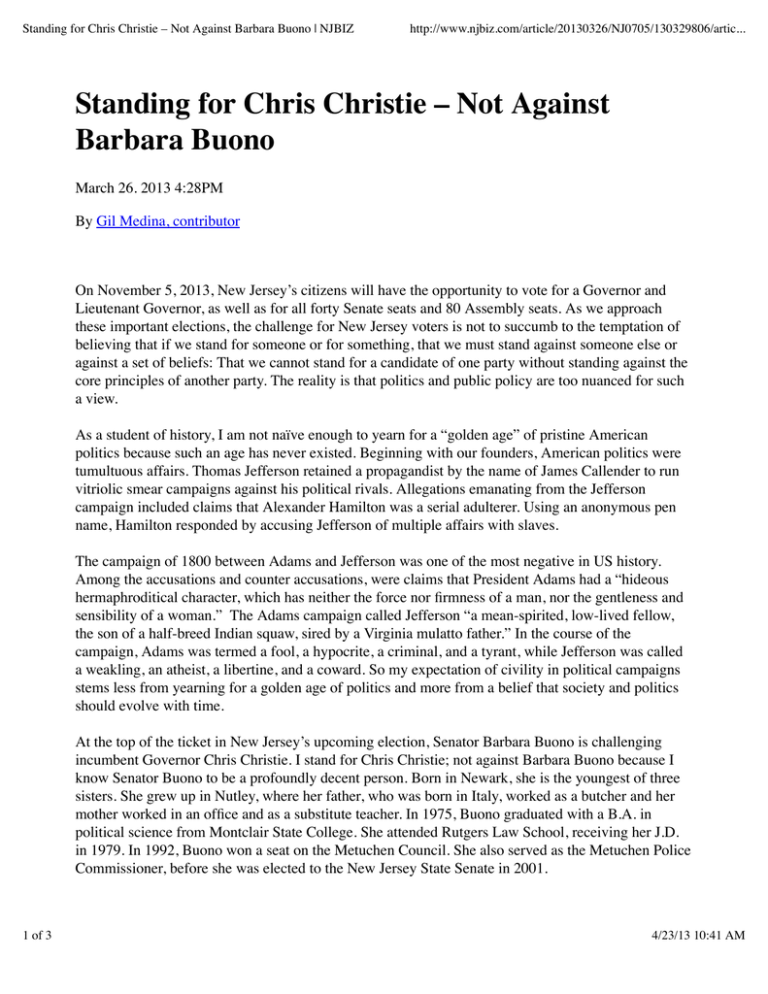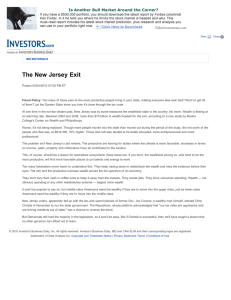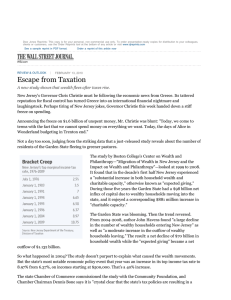Standing for Chris Christie – Not Against Barbara Buono |...
advertisement

Standing for Chris Christie – Not Against Barbara Buono | NJBIZ http://www.njbiz.com/article/20130326/NJ0705/130329806/artic... Standing for Chris Christie – Not Against Barbara Buono March 26. 2013 4:28PM By Gil Medina, contributor On November 5, 2013, New Jersey’s citizens will have the opportunity to vote for a Governor and Lieutenant Governor, as well as for all forty Senate seats and 80 Assembly seats. As we approach these important elections, the challenge for New Jersey voters is not to succumb to the temptation of believing that if we stand for someone or for something, that we must stand against someone else or against a set of beliefs: That we cannot stand for a candidate of one party without standing against the core principles of another party. The reality is that politics and public policy are too nuanced for such a view. As a student of history, I am not naïve enough to yearn for a “golden age” of pristine American politics because such an age has never existed. Beginning with our founders, American politics were tumultuous affairs. Thomas Jefferson retained a propagandist by the name of James Callender to run vitriolic smear campaigns against his political rivals. Allegations emanating from the Jefferson campaign included claims that Alexander Hamilton was a serial adulterer. Using an anonymous pen name, Hamilton responded by accusing Jefferson of multiple affairs with slaves. The campaign of 1800 between Adams and Jefferson was one of the most negative in US history. Among the accusations and counter accusations, were claims that President Adams had a “hideous hermaphroditical character, which has neither the force nor firmness of a man, nor the gentleness and sensibility of a woman.” The Adams campaign called Jefferson “a mean-spirited, low-lived fellow, the son of a half-breed Indian squaw, sired by a Virginia mulatto father.” In the course of the campaign, Adams was termed a fool, a hypocrite, a criminal, and a tyrant, while Jefferson was called a weakling, an atheist, a libertine, and a coward. So my expectation of civility in political campaigns stems less from yearning for a golden age of politics and more from a belief that society and politics should evolve with time. At the top of the ticket in New Jersey’s upcoming election, Senator Barbara Buono is challenging incumbent Governor Chris Christie. I stand for Chris Christie; not against Barbara Buono because I know Senator Buono to be a profoundly decent person. Born in Newark, she is the youngest of three sisters. She grew up in Nutley, where her father, who was born in Italy, worked as a butcher and her mother worked in an office and as a substitute teacher. In 1975, Buono graduated with a B.A. in political science from Montclair State College. She attended Rutgers Law School, receiving her J.D. in 1979. In 1992, Buono won a seat on the Metuchen Council. She also served as the Metuchen Police Commissioner, before she was elected to the New Jersey State Senate in 2001. 1 of 3 4/23/13 10:41 AM Standing for Chris Christie – Not Against Barbara Buono | NJBIZ http://www.njbiz.com/article/20130326/NJ0705/130329806/artic... In the past decade, our region has experienced a terror attack that fundamentally changed how we view the world. We endured a Great Recession and more recently Sandy tested our resilience. And our state’s economy and future competitiveness have been put to the test like never before. It was into this cauldron that Chris Christie became Governor. Also born in Newark, he was raised in Livingston and has lived in New Jersey his entire life, except to attend college at the University of Delaware. After graduating college in 1984, Christie attended Seton Hall University School of Law graduating in 1987. He joined a Cranford law firm, where he was soon named a partner, was elected a Freeholder in Morris County, and served as Director of the Board in 1997. In 2002, Christie was named U.S. Attorney for the District of New Jersey where he established a national reputation as a crusader against corruption. When he took the oath as New Jersey’s 55th Governor in 2010, he inherited an $11 billion budget deficit, a state that was hemorrhaging jobs, a regulatory and tax system that discouraged investment, the out-migration of our wealthiest citizens, and a populist political culture that promised more of the same policies that created the mess the state was in. In fact, the greatest threat to New Jersey’s future is the return to power of the well-meaning populists of both parties who controlled our state government for most of the first decade of the new century with disastrous consequences for the state. In a study by the Center on Wealth and Philanthropy at Boston College, “Migration of Wealth in New Jersey and the Impact on Wealth and Philanthropy”, the authors reported that from 1999 through 2003, there was a net influx of $98 billion in household wealth into New Jersey. In the subsequent five years from 2004 through 2008, New Jersey experienced a near total reversal of the flow. The result was a shift from a net inflow of $98 billion to a net outflow of $70 billion, for a total decline in wealth of $168 billion. Wealth migration and wealth creation are important to all citizens in many ways. The Boston College study notes that, according to Federal Reserve Data, about 9 percent of U.S. households have at least $1 million in net worth. According to the study, “That 9% made the majority of charitable contributions, owned the majority of equity in unincorporated and closely held businesses, and had a disproportionately large share of investable assets as compared with the remaining 91% of the population.” In other words, these individuals are the source of wealth creation for all members of society. As the Boston College study states, “Most (more than 90%) millionaires acquired their wealth in their own lifetimes through business, investment, or service as corporate executives rather than through inheritance. The majority became wealthy through growing their own business or investing in businesses of others. They tend to be entrepreneurial and agents of economic expansion.” Wealth in our country, therefore, is not largely about hereditary prosperity. Rather, it is about the realization of the American Dream. Employment creation is another criterion that we can utilize to gauge how our state faired in the decade of the 1990s in comparison to the first decade of this century. We ended the decade of the 90s 2 of 3 4/23/13 10:41 AM Standing for Chris Christie – Not Against Barbara Buono | NJBIZ http://www.njbiz.com/article/20130326/NJ0705/130329806/artic... with 254,000 more jobs than when we started it. Private sector employment growth was responsible for generating 242,800 of those jobs and government employment was responsible for only 11,200. In the decade of January 1990 to December 1999, the state lost 26,100 jobs. We lost 94,300 private sector jobs and gained 68,200 government sector jobs. Governor Chris Christie took office as a national recession was ending. He had the challenge of reversing a poor business climate, staunching wealth out-migration, creating faith in the state as an investment destination, and creating sufficient economic growth to provide employment for our citizens and tax revenue to stabilize the state’s a precarious fiscal position. He has been accomplishing it through tax policy reform, a responsive economic development team, job creation incentives, regulatory reform, public/private partnerships and personal engagement in marketing the state to business leaders globally. More importantly, Governor Christie understands that all of the policies referenced above are critical tools in the competition for investment and jobs. Economic development is as much about economic determinants as it is about creating a mythology of excellence. If a jurisdiction establishes a positive business climate trend-line, it can create a reputation about itself that is greater than the reality and buy time to allow actual reforms to catch up with perception. Governors are high profile, charismatic people. They are the greatest assets that states have in promoting themselves as investment destinations. They also have the most impact in forging a state’s economic determinants and mythology. Governor Christie clearly understands this. Since taking office, Christie has sought to restore fiscal balance to state and local government, to contain the rate of increase of property taxes, to institute reform of the state’s pension and health benefits system, and to turn around failing schools in the state. The problems he inherited were great and his agenda ambitious; but for the first time in decades, New Jersey can actually boast that we are making progress. Much work remains to be done and Governor Christie has demonstrated the type of obdurate determination necessary to overcome the barriers to progress for this state. He is the right leader for our times. That is why I stand for Chris Christie without standing against Barbara Buono. www.NJBIZ.com 3 of 3 4/23/13 10:41 AM


